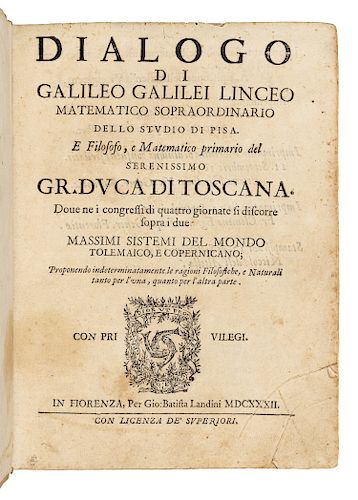GALILEI, Galileo (1564-1642). Dialogo...Dove ne i congressi di quattro giornate si discorre sopra i due massimi sistemi del mondo Tolemaico, e Coperni
Lot 40
About Seller
Hindman
1338 West Lake Street
Chicago, IL 60607
United States
Recognized as the Midwest's leading fine art auctioneers, Hindman Auctioneers has built a worldwide reputation based on a full service approach to the auction business tailored to meet the individual needs of our clients. Coming from a variety of educational backgrounds, specialists bring years of e...Read more
Categories
Estimate:
$30,000 - $40,000
Absentee vs Live bid
Two ways to bid:
- Leave a max absentee bid and the platform will bid on your behalf up to your maximum bid during the live auction.
- Bid live during the auction and your bids will be submitted real-time to the auctioneer.
Bid Increments
| Price | Bid Increment |
|---|---|
| $0 | $25 |
| $500 | $50 |
| $1,000 | $100 |
| $2,000 | $250 |
| $5,000 | $500 |
| $10,000 | $1,000 |
| $20,000 | $2,500 |
| $50,000 | $5,000 |
| $100,000 | $10,000 |
About Auction
By Hindman
Nov 5, 2019
Set Reminder
2019-11-05 11:00:00
2019-11-05 11:00:00
America/New_York
Bidsquare
Bidsquare : Library of a Midwestern Collector
https://www.bidsquare.com/auctions/hindman-auctions/library-of-a-midwestern-collector-4496
Hindman Bidsquare@hindmanauctions.com
Hindman Bidsquare@hindmanauctions.com
- Lot Description
GALILEI, Galileo (1564-1642). Dialogo...Dove ne i congressi di quattro giornate si discorre sopra i due massimi sistemi del mondo Tolemaico, e Copernicano. Florence: Giovanni Batista Landini, 1632.
4to (211 x 156 mm). Woodcut diagrams. (Lacking etched frontispiece and final blank, as often; title-page with separation along paper flaw just crossing date in the imprint, ca 12 leaves with cut to upper margin mostly affecting headlines, occasionally crossing a few lines of text with slight loss of a few letters K1 & K2, Bb quire misbound, some browning or spotting.) Late 17th- or early 18th-century Italian vellum, spine gilt (minor repairs to head of spine, short separations along joints, some minor wear or soiling). Provenance: Note on pastedown and marginalia in an early Italian hand; G. B. Cagnola (early signature); early shelfmarks; Libri di Carlo A. Chiesa, (bookseller’s pencil notations on rear pastedown). FIRST EDITION OF GALILEO'S CELEBRATED DEFENSE OF THE COPERNICAN VIEW OF THE SOLAR SYSTEM. Eight years after Pope Paul V forbade Galileo to teach Copernican theory, Pope Urban VIII granted him permission to discuss Copernican astronomy in a book. Galileo's use of the formal dialogue allowed him to explore his Copernican theories fully within the rubric of the "equal and impartial discussion" required by Pope Urban VIII. The work "was designed both as an appeal to the great public and as an escape from silence... it is a masterly polemic for the new science. It displays all the great discoveries in the heavens which the ancients had ignored; it inveighs against the sterility, willfulness, and ignorance of those who defend their systems; it revels in the simplicity of Copernican thought and, above all, it teaches that the movement of the earth makes sense in philosophy, that is, in physics... The Dialogo, more than any other work, made the heliocentric system a commonplace" (PMM). Pope Urban VIII immediately convened a special commission to examine the book and make recommendations. In depicting the Pope as the simple-minded Aristotelian Simplicius, Galileo brought upon himself arrest, trial by the Inquisition and life imprisonment. The sentence was commuted to permanent house arrest, while the printing of any of his works was forbidden. The Dialogo remained on the index until 1832. Carli and Favaro, 128; Cinti 89; Dibner Heralds of Science 8; Grolier/Horblit 18c; Norman 858; PMM 128; Riccardi I:511; Wellcome 2647a.
For condition inquiries please contact Gretchen Hause at gretchenhause@hindmanauctions.comCondition
- Shipping Info
-
Please refer to https://hindmanauctions.com/shipping-packing
-
- Buyer's Premium



 EUR
EUR CAD
CAD AUD
AUD GBP
GBP MXN
MXN HKD
HKD CNY
CNY MYR
MYR SEK
SEK SGD
SGD CHF
CHF THB
THB












